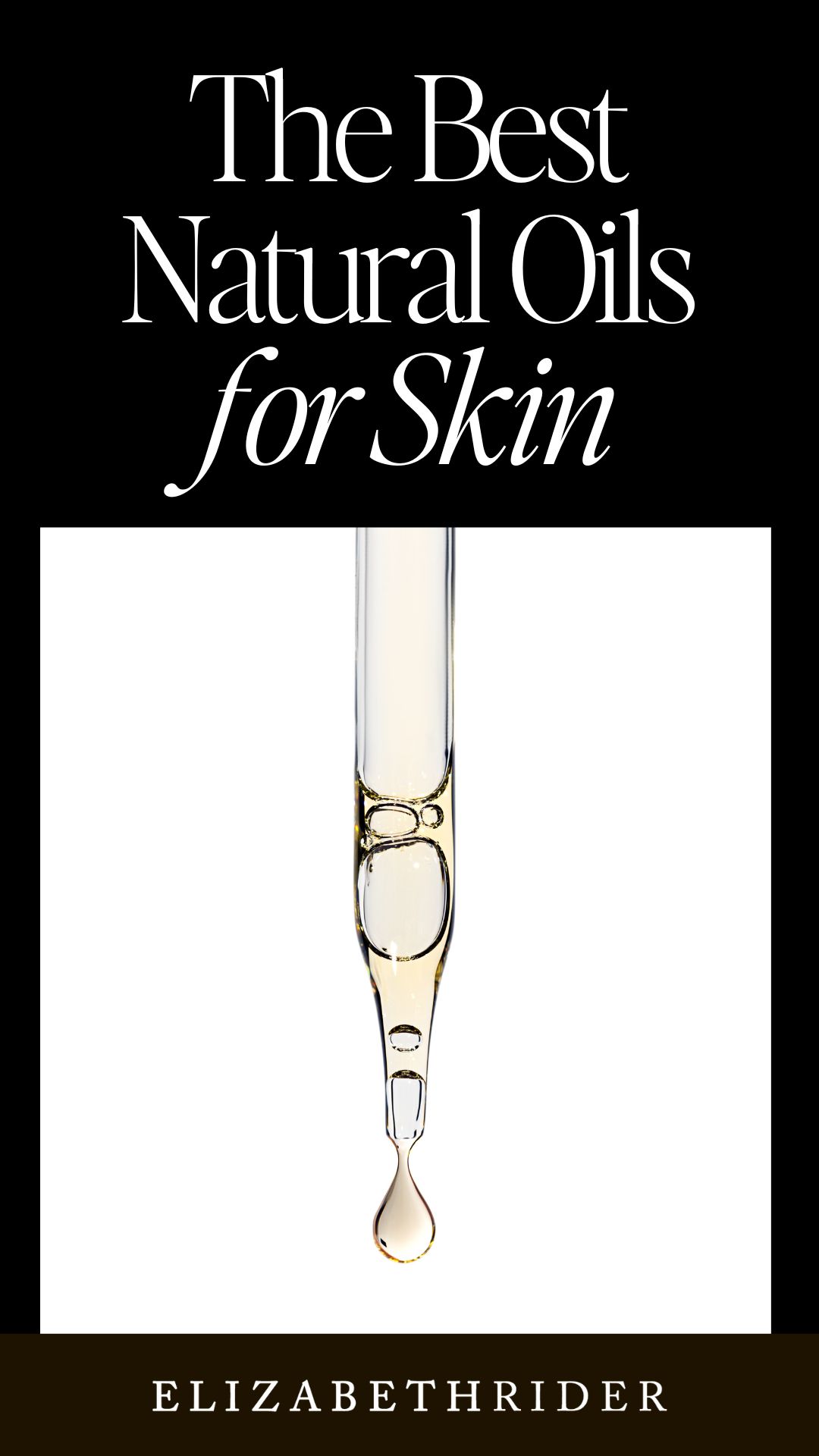The Best Natural Oils for Healthy Skin

I suggest keeping your cooking oils, like coconut oil, separate from skin and bathroom oils to keep everything clean. I keep the Thrive Market coconut oil (here’s 40% off your first order) in my kitchen, and this fractionated coconut oil in my bathroom.
Not onto my top two favorites, jojoba oil and almond oil.
Jojoba Oil for Skin
Ideal for face, lips, body, hands, and feet.
Jojoba oil is well-known for its ability to aid in skin barrier repair. It has anti-inflammatory, antioxidant, and wound-healing properties.
Jojoba oil for skin can also improve the absorption of topically applied medications and may be helpful in treating acne. I love it for an all-over moisturizer right out of the shower and use it frequently during the day after washing my hands on my cuticles because of how quickly it absorbs.
Jojoba for skin is one of my all-time favorite oils. I keep this organic jojoba oil in my bathroom at all times:
Almond Oil for Skin
Ideal for face, lips, body, hands, and feet.
Almond oil is known for its moisturizing properties and potential anti-aging effects. Research suggests that topical application of almond oil may help repair the skin barrier.
I love almond oil for skin (sometimes called sweet almond oil) as a main moisturizer for my arms and legs. Sometimes I mix it into Aveeno body lotion, and sometimes I use it solo.
I keep this organic almond oil in my bathroom:
Castor Oil for Skin
Ideal when mixed with jojoba or almond oil for spot-treating trouble areas.
Castor oil is a versatile carrier oil known for its moisturizing and nourishing properties. It is derived from the seeds of the castor plant (Ricinus communis) and has been used as a healing oil for centuries.
Castor oil is not only anti-inflammatory, but it also has a high concentration of fatty acids, particularly ricinoleic acid, which helps lock in moisture and hydrate the skin. It forms a protective barrier on the skin, preventing water loss and keeping it supple.
When using castor oil, it’s important to note that it is a thick and viscous oil. Therefore, it’s often recommended to dilute it with other carrier oils like jojoba or almond oil before applying it to the skin or hair. I personally mix it with jojoba oil in a 4:1 ratio of jojoba to castor oil.
Grapeseed Oil
Ideal for massage or as a general moisturizer.
Grapeseed oil offers several benefits for the skin. It has antibacterial, antioxidant, and wound-healing properties. Some studies also suggest that grapeseed oil has anti-inflammatory and anti-aging effects.
It’s also a nice light texture, making it great for massage or an overall body moisturizer.
Olive Oil
Ideal for a moisturizer.
Olive oil has long been used in skincare due to its numerous benefits. It has anti-inflammatory, antioxidant, and wound-healing effects when applied topically. There’s also evidence linking olive oil to potential anti-aging effects.
While it’s great for the skin, I love it in my salads and feel like I’m rubbing salad dressing on my body, so I generally leave the olive oil in the kitchen. In a pinch, it makes a great moisturizer if you need it.
Sunflower Seed Oil
Ideal for a moisturizer.
Sunflower seed oil is known for its ability to improve skin hydration and promote skin barrier repair. Research also shows that it has anti-inflammatory effects and may aid in wound healing. It’s not as easy to come by, so I don’t go out of my way to buy it.
Argan Oil
Ideal for a facial moisturizer.
Argan oil is a popular skincare oil that helps with skin barrier repair. It has anti-inflammatory and wound-healing effects. Topical application of argan oil has also been shown to improve skin elasticity, making it beneficial for anti-aging purposes.
Rosehip Seed Oil
Ideal for a facial moisturizer.
Rosehip seed oil is rich in antioxidants and has anti-inflammatory properties. It can help with skin barrier repair and fight signs of aging. Additionally, rosehip seed oil offers antioxidant benefits for the skin.
Marula Oil
Ideal for a body moisturizer.
Marula oil is highly moisturizing and helps the skin retain moisture effectively. It’s non-irritating and suitable for various skin types.
Do oils for skin care need to be organic?
Organic oils are derived from plants that have been grown without the use of synthetic pesticides, herbicides, or genetically modified organisms (GMOs). I personally choose organic varieties when using oil on my skin to avoid potentially harmful chemicals from synthetic pesticides, herbicides, and other treatments.
While organic oils offer these potential benefits, it’s important to note that certification standards may vary across regions and countries. Look for reputable brands that carry recognized organic certifications to ensure the authenticity and quality of the products you choose.
You can find links to my favorite oils in the Natural Oils for Skincare section of my Amazon Storefront

Essential Oils for Skin
Essential oils are highly concentrated plant extracts known for their aromatic properties. They can offer a range of skincare benefits when used properly.
My personal take is that most of us are not chemists (very cool if you are!) so it’s best to leave the experiments to the scientists. Essential oils can work on a sensory level to provide relaxing or stimulating benefits, so if you enjoy them play around with them, but don’t rely on their benefits unless the formula has substantial scientific studies.
Essential oils are typically added a few drops at a time into one of the carrier oils described above. It’s not recommended to use essential oils in high concentrations because of their powerful effects. Start small and add a few drops at a time if you plan to use them.
Here are some essential oils that promote healthy skin:
Tea Tree Oil
Tea tree oil is commonly used to manage acne due to its antimicrobial properties. It is also believed to help reduce inflammation associated with acne breakouts.
Peppermint Oil
Peppermint oil contains menthol, which narrows blood vessels and can help reduce skin redness. It’s often used in skincare products to relieve pain and itching associated with pruritus (skin infection).
Chamomile Oil
Chamomile oil is derived from Matricaria chamomilla and has demonstrated effectiveness as a moisturizer and treatment for inflammation, pruritus, and dermatitis.
Rosemary Oil
Rosemary oil contains compounds that act as antioxidants and anti-inflammatories. Some people suggest that it may protect against hair loss and help regrow hair, but there are not substantial studies to back up those claims. Rosemary oil is used to help keep skincare products from degrading.
Oregano Oil
Oregano oil has antimicrobial properties and may be helpful in treating acne. It contains antioxidants and acts as an anti-inflammatory, making it potentially beneficial for reducing signs of aging.
Remember to patch-test any new oil for skin before applying it all over your face or body to ensure you don’t have any adverse reactions. Simply put a small dot of the oil on the inside of your forearm and let it absorb for a few hours to see how you react to it before putting it on a larger area.
Now that you know about these amazing natural oils for healthy skin, go ahead and explore which ones work best for you! Your skin will thank you for the extra love and care.
Please note that while natural oils can be beneficial for your skin, it’s always a good idea to consult with a dermatologist or skincare professional if you have specific concerns or conditions.






